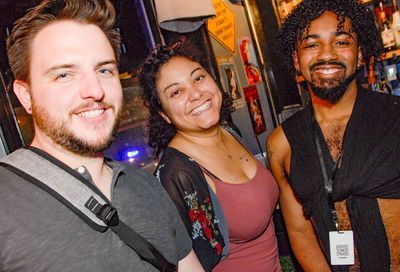Congress Rolling Back Riders
D.C. may find new freedom in implementing medical marijuana, needle exchange
Time and again over the past decades, the District has been held back from implementing measures that some in Congress don’t like, from needle-exchange programs to medical marijuana to domestic partnerships and beyond.
Congressional oversight of the D.C. budget has allowed Congress to pass ”riders” that are attached to the annual appropriations bill, stopping the D.C. government from acting on measures passed by D.C. Council or, in one notable case, by District residents.
The riders often have been used to halt measures of interest to the LGBT and HIV/AIDS communities from moving forward. What’s more, the riders are so common that the City Council’s general counsel, Brian Flowers, is incredulous at the thought of a budget bill without one.
”I cannot even imagine a rider-free Appropriations Act,” says Flowers, who has worked as a lawyer for the City Council since 1997. ”I’ll believe it when see it.”
With Sunday’s passage by the Senate of the omnibus appropriations bill, though, the District was a step closer to having the most onerous riders wiped clean from the budget. The House passed the measure a few days earlier, and President Obama is expected to sign the bill this week.
Among the measures that are removed is a long-standing rider that kept a medical-marijuana initiative passed overwhelmingly by D.C. voters in 1998 from being implemented. As Flowers, the lead lawyer for City Council, says, ”The only step that remains is for it to be transmitted” to Congress for the required 30-day review period for which all District legislation must be submitted.
D.C. Delegate Eleanor Holmes Norton, however, told the Washington City Paper on Friday that Initiative 59 did not need to be submitted for the review period. ”The Congress speaks when it says, ‘We overturned that [rider],'” she told that paper. “That means you can do it.”
Although noting that he has not yet seen the final bill, Flowers was not quite so certain. ”Normally when Congress speaks, they have to speak affirmatively,” he says. ”If it has affirmative language, I’d agree with that, but it sounds like it’s silent.”
If Flowers is right, and the language of the 1998 initiative still needs to go before Congress, some have suggested that too much has changed regarding medical-marijuana programs since 1998 and City Council should revise the language.
Even Wayne Turner – who led the 1998 effort to pass the initiative after his partner, Steve Michael, died of complications from AIDS – was supportive of looking at and revising the language.
Noting that there are ”13 states that have instituted [medical marijuana] initiatives,” Turner says, ”I welcome these opportunities to look at what are the best practices” and determine ”what is the best fit for D.C.”
Regardless of the direction, Flowers says the ”relevant committees” – the Health Committee headed by Councilmember David Catania (I-At Large) and the Public Safety and the Judiciary Committee headed by Councilmember Phil Mendelson (D-At Large), both supporters of the measure – will carefully consider the best way of implementing the long-since-passed measure.
As Turner says, he is looking to see ”an implementation plan that effectively protects patients and our communities.” Noting that ”it doesn’t need to happen overnight,” Turner stresses the importance of implementing medical marijuana in a way that ”doesn’t raise alarms in Congress.”
The other main measure affecting the LGBT and HIV/AIDS communities has been the ban on D.C. and federal funds being used for needle-exchange programs, aimed to decrease the spread of HIV among those using used needles. The ban on District funds was lifted last year, but professionals say that D.C. is still catching up on lost time.
The executive director of the District’s only needle-exchange program until recently, Prevention Works!, says that the federal government’s prohibition on District funds being used in needle-exchange efforts have left the District, ”way behind the curve.” Dr. Philip Terry-Smith says, ”We’re 10 years behind” as a result of the long-standing ban.
At issue this year was a new, particularly restrictive measure inserted in the House that would have all but prohibited needle-exchange programs in the District. Terry-Smith called the measure, which was removed from the final bill, a ”slingshot” that could have ”set things back” had it made it into law.
In addition to the ban on District funding until last year, there has been a long-standing ban on federal funding of needle-exchange programs. That, too, has been lifted in this year’s budget bill.
The move left Terry-Smith almost speechless: ”It’s like winning the lottery if you’ve been operating on a shoestring budget.”
A measure removing a rider relating to the D.C. government’s original domestic-partnership registry is not expected to have much, if any, practical impact, according to several sources. Congress cleared the city to use local funds for any overhead related to D.C. domestic partnerships in 2002, following a 10-year prohibition.
Support Metro Weekly’s Journalism
These are challenging times for news organizations. And yet it’s crucial we stay active and provide vital resources and information to both our local readers and the world. So won’t you please take a moment and consider supporting Metro Weekly with a membership? For as little as $5 a month, you can help ensure Metro Weekly magazine and MetroWeekly.com remain free, viable resources as we provide the best, most diverse, culturally-resonant LGBTQ coverage in both the D.C. region and around the world. Memberships come with exclusive perks and discounts, your own personal digital delivery of each week’s magazine (and an archive), access to our Member's Lounge when it launches this fall, and exclusive members-only items like Metro Weekly Membership Mugs and Tote Bags! Check out all our membership levels here and please join us today!



















